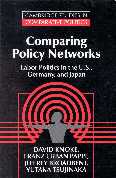| David Knoke, Franz Urban Pappi, Jeffrey Broadbent, Yutaka Tsujinaka | |||
| Comparing Policy Network |

|
||
| 288 S., Cambridge, Cambridge Univ. Press,1996 | |||
| ISBN 0-521-49927-5 | |||
| Gehe zum |
Abstract
The United States, Germany, and Japan - the world's three most powerful and successful free market societies - differ strikingly in how their governments relate to their economies. Comparing Policy Networks reports the results of collaborative research by three teams investigating the social organization and policy-making processes of national labor policy domains in the United States, Germany, and Japan during the 1980s.
Through data collected from interviews with more than 350 key labor policy organizations, including labor unions, business associations, professional societies, public interest groups, advisory boards, governmental agencies and ministries, political parties, and legislative committees, the researchers uncovered fundamental business-labor cleavages underlying the labor policy domains in all three societies. These patterns were revealed in both the contemporary policy debates and the bistorical development of each national domain.
Labor legislation fights were structured by action sets, or coalitions of organizations, that shared preferences on specific policy events and worked together to affect their outcomes. An irreconcilable labor-business antagonism seemed most evident in the U.S., whereas a more accommodating stance was apparent in Germany and in Japan. Each domain's power structure reflected a distinctive national variation on the organizational theme: Japan had a single corporatist center comprised of the government and Liberal Democratic Party that dominated all players; Germany's pluralistic twin centers coalesced around the party partners of the conservative government-, and the U.S. was polarized between party and class organizations, reflecting its divided federal government in the Reagan era.
Tables of Contents
Preface
Acknowledgements
1 Policy-making in the Organizational State
2 Three Labor Policy Domains
3 Finding Domain Actors
4 Organizational Policy Interests (written with Naomi J. Kaufman)
5 Policy Webs: Networks, Reputations, and Activities (written with Naomi J. Kaufman)
6 Fighting Collectively: Action Sets and Events
7 Exchange Processes (written with Thomas König)
8 Power Structures (written with Willi Schnorpfeil)
9 Variations on a Theme of Organizational States
Appendix 1: Legislative Procedures in Three Nations
Appendix 2: Labor Policy Domain Organizations by Type
Appendix 3: Cluster Analyses of Labor Policy Dornain Issues
Appendix 4: Labor Policy Domain Legislative Bills
References
Index